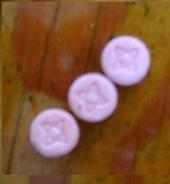ec·sta·sy (n): The state of being beside one's self or rapt out of one's self; a state in which the mind is elevated above the reach of ordinary impressions, as when under the influence of overpowering emotion; an extraordinary elevation of the spirit, as when the soul, unconscious of sensible objects, is supposed to contemplate heavenly mysteries.
MDMA (also commonly known as Ecstacy, X, E, XTC, Adam, etc.) is a semi-synthetic chemical compound. In its pure form, it is a white crystalline powder. It usually seen in capsule form, in pressed pills, or as loose powder. Average cost ranges from $10-$30 (U.S.) a dose. Common routes of administration are swallowing or snorting, although it can be smoked or injected as well. Currently, MDMA is on the U.S. Schedule I of controlled substances, and is illegal to manufacture, possess, or sell in the United States. Most other countries have similar laws.
The physical effects of usual doses of MDMA are subtle and variable: some users report dryness of mouth, jaw clenching, teeth grinding, nystagmus (eye wiggles), sweating, or nausea. Others report feelings of profound physical relaxation. At higher doses (overdoses), the physical effects of MDMA resemble those of amphetamines: fast or pounding heartbeat, sweating, dizziness, restlessness, etc.
The Short-Term Effects of Ecstasy:
» nausea
» hallucinations
» chills & sweating
» increased body temp
» tremors
» muscle cramping
» blurred vision
The effects start after about 20 minutes and can last for hours. There is a 'rush' feeling followed by a feeling of calm and a sense of well being to those around, often with a heightened perception of color and sound. Some people actually feel sick and experience a stiffening up of arms, legs and particularly the jaw along with sensations of thirst, sleeplessness, depression and paranoia. The drug gives a feeling of energy and some mild hallucinogenic effects. Many problems users encounter with Ecstasy are similar to those found with the use of amphetamines and cocaine. They include increases in heart rate and blood pressure, nausea, blurred vision, faintness, chills, sweating, and such psychological problems as confusion, depression, sleep problems, craving, severe anxiety, paranoia, and psychotic episodes. Ecstasy's chemical cousin, MDA, destroys cells that produce serotonin in the brain. These cells play a direct roll in regulating aggression, mood, sexual activity, sleep, and sensitivity to pain.
What Are the Long-Term Effects of Ecstasy?
The effects of long-term MDMA use are just beginning to undergo scientific analysis. In 1998, the National Institute of Mental Health conducted a study of a small group of habitual MDMA users who were abstaining from use. The study revealed that the abstinent users suffered damage to the neurons in the brain that transmit serotonin, an important biochemical involved in a variety of critical functions including learning, sleep, and integration of emotion. The results of the study indicate that recreational MDMA users may be at risk of developing permanent brain damage that may manifest itself in depression, anxiety, memory loss, and other neuropsychotic disorders. MDMA stimulates the release of the neurotransmitter serotonin from brain neurons, producing a high that lasts from several minutes to an hour. The drug's rewarding effects vary with the individual taking it, the dose and purity, and the environment in which it is taken. MDMA can produce stimulant effects such as an enhanced sense of pleasure and self-confidence and increased energy. Its psychedelic effects include feelings of peacefulness, acceptance, and empathy. Users claim they experience feelings of closeness with others and a desire to touch them. Because MDMA engenders feelings of closeness and trust and has a short duration of action, some clinicians claim that the drug is potentially valuable as a psychotherapeutic agent.
MySpace Layouts @ HOT FreeLayouts.com
HotFreeLayouts
